Kitchens come in many design options and are an integral part of any home. Kitchen countertops can be made with a wide variety of materials and in this article, we will discuss some of the options. Surprisingly, the materials used in kitchen countertops are amazingly diverse. Each material has its advantages and disadvantages, all of which need to be weighed when choosing.
For instance, the more esoteric materials such as bamboo, zinc, and stainless steel are too expensive and hard to maintain for most people. For most homeowners, the more practical options will include materials such as slab granite, engineered stone (quartz), solid surface material, as well as traditional laminates and ceramic tile.
Hence, before making a decision on a countertop material, check out these top 10 kitchen countertops.
1. Laminate Kitchen Countertop Materials
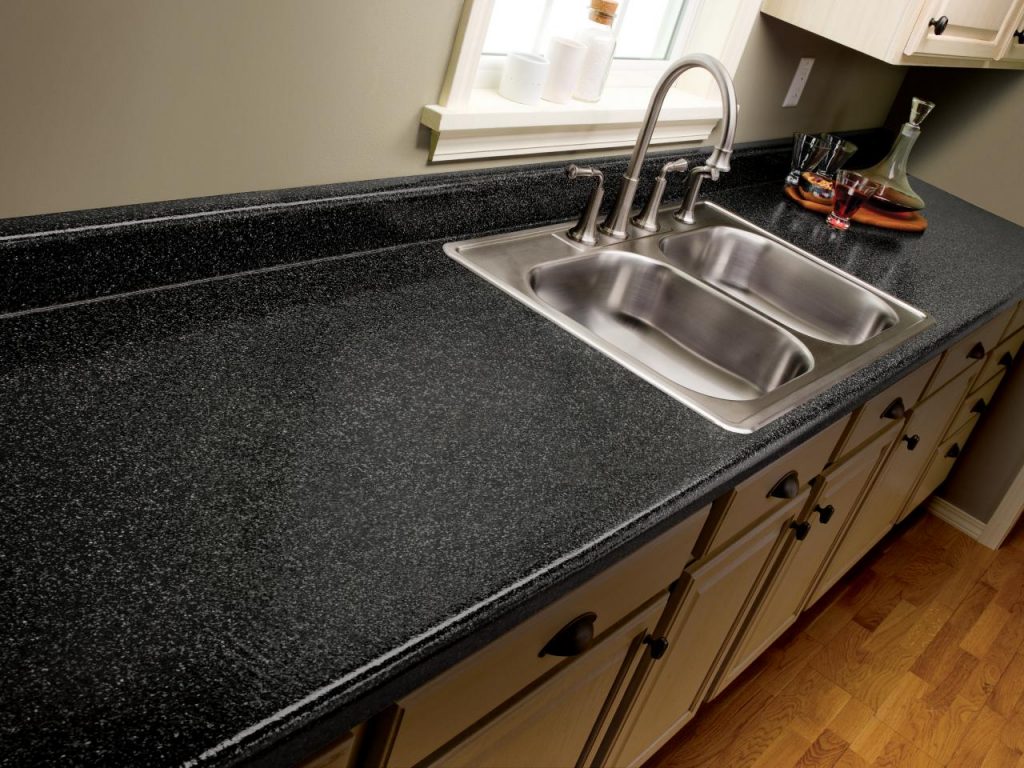
Laminate is formed from a thin layer of plastic laminate material. It is bonded to a core of particleboard or MDF (medium-density fiberboard). Many manufacturers are making laminates, and hundreds of color and style options exist.
Pros
- It is the most affordable option.
- Installation is easy in the project, particularly when you install pre-fabricated (post-form) countertop sections.
- Unique designs are possible if you build a countertop from scratch using designer laminates. Thousands of colors and patterns are available.
Cons
- It lowers resale value.
- Laminate will peel up, chip, and scorch easily.
- It can feel hollow and lightweight compared to other materials.
Laminates are now making a big comeback. Choose the best laminates here.
2. Ceramic tile Kitchen Countertop Materials
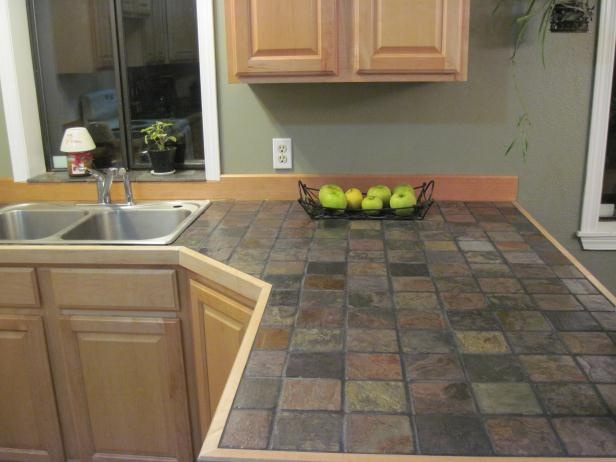
Ceramic countertops are made from individual clay-based tiles adhered over a cement-board core using thin-set mortar adhesives. For kitchen countertops, grout seams make tile unfavorable in countertop material. But newer ceramic and porcelain tiles are available in large (1 x 2 or 2 x 2) sizes in feet, which can help minimize the number of seams and make for easier upkeep.
Pros
- Ceramic tile is inexpensive countertop material.
- It is relatively easy to install.
- It offers diverse design options such as porcelain tiles which looks like natural wood, real stone, and many other materials.
Cons
- It can be easily stained and hard to clean.
- Brittle in nature and prone to cracking.
- It is difficult to repair, requiring a full replacement of damaged tiles.
Ceramic tile countertops are a good option for someone seeking to save money. Newer porcelain and glass tiles give a much wider range of design options than ever before. But tile in any form requires a lot of maintenance, and many grout seams can be a headache to keep clean.
3. Granite slab Kitchen Countertop Materials
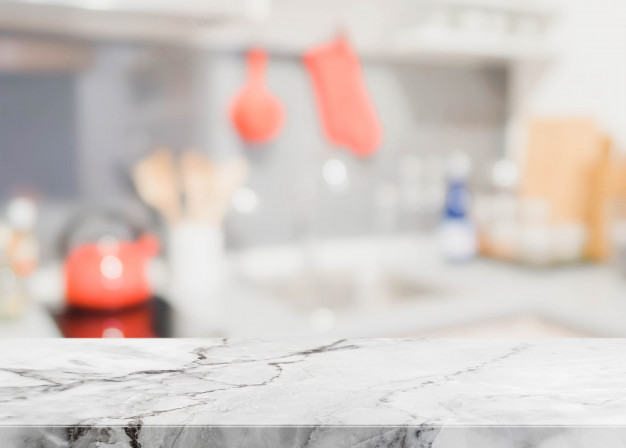
Granite natural stones are popular choices for a kitchen countertop, and of these, the most popular option is a countertop made from a solid slab of granite. The granite countertops can be fabricated to specification and installed by professional crews.
Pros
- Solid granite slabs make very heavy and durable countertops.
- No two pieces of granite are alike, making each countertop unique.
- Considered a premium building material, granite countertops tend to improve home real estate values.
- No-seam countertops are usually possible.
Cons
- Granite is a fairly expensive material.
- Like many other types of natural stone, granite requires periodic sealing to protect it from stains.
- Granite is not a friendly material for putting designer elements. It can be installed by professionals.
Granite slabs are the most popular option! Slabs are a better choice than the other granite options like modular granite and granite tile.
4. Modular granite Kitchen Countertop Materials
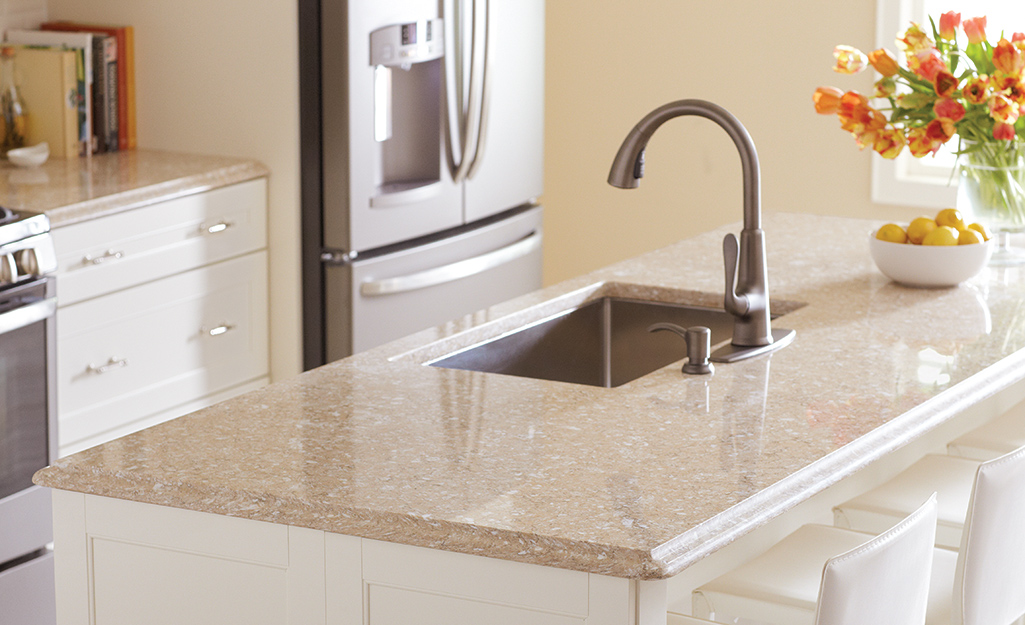
A less expensive option for homeowners who want granite or those who want to install granite themselves by saving money is modular granite. It occupies a niche halfway between solid slabs and granite tiles. It can be described as large tiles pieced together to form a countertop. Although huge, modular pieces are lighter than slabs, making them a decent option for designers.
Pros
- It is possible to install by a homeowner. The hardest part is hefting the slabs around.
- Inexpensive by granite countertop standards.
Cons
- These countertops will still have some seams and will not look like solid slabs.
- Modular slabs are considerably thinner than solid slabs, and they can be cracked or broken.
- Like solid granite, periodic sealing is necessary to protect against stains.
While modular granite does offer homeowners an opportunity to install themselves, they are somewhat inferior in look and performance to solid slabs. Further, installation is harder than it first appears.
5. Granite Tile Kitchen Countertop Materials
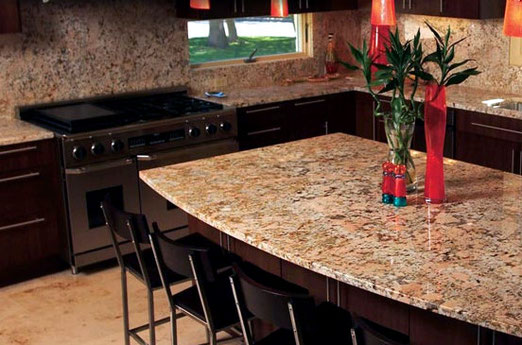
These are small, manageable tiles that resemble ceramic tiles and are installed in much the same way, adhered with thin-set adhesives to a core of cement-board.
Pros
- It offers prestige, though not the same as solid stone slabs.
- It is possible to install by a homeowner in a weekend or two.
- Granite tile is the cheapest and easiest of the granite options.
Cons
- Tiles are thinner, and hence more susceptible to breaking and cracking.
- The many grout seams can be easily stained and are difficult to clean.
- Like all-natural stone, granite tiles must be periodically sealed to protect them against stains.
Granite tile kitchen countertops are generally less admired than solid granite or even modular granite countertops. But they are an option for homeowners seeking to save money by installing the countertop themselves.
6. Marble Kitchen Countertop Materials
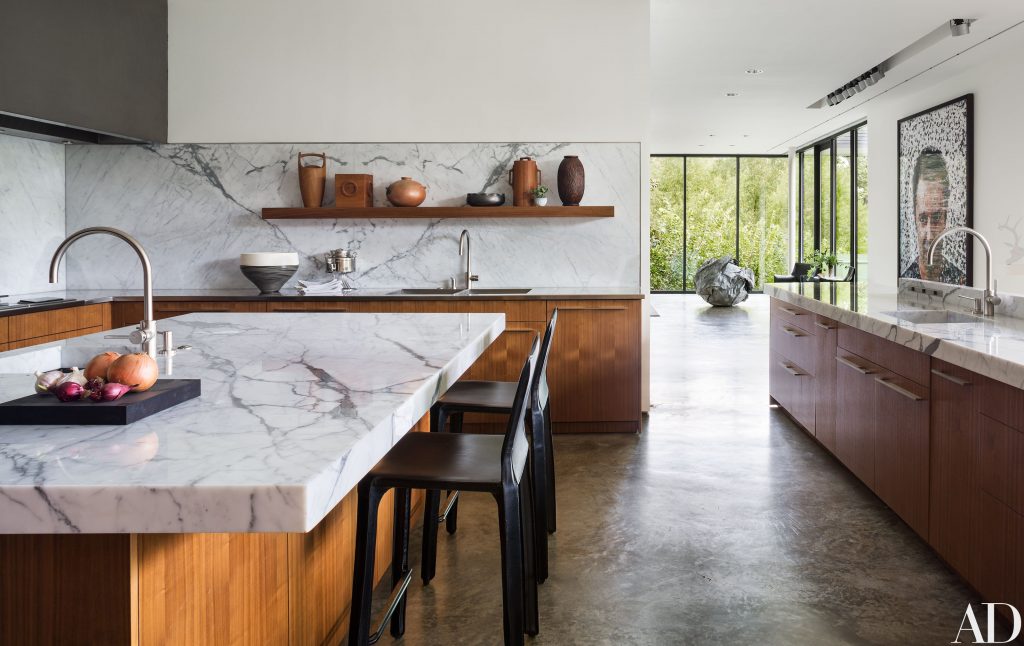
The marble natural stone is a high demand option, although it has limitations. Marble is a relatively soft and porous stone carefully and repeatedly sealed if used for kitchen countertops. Like granite, marble also is available in three forms – slabs, modular marble, and marble tiles. Among them, solid slabs are the best choice.
Pros
- Marble has a natural veining that makes it the most beautiful of all-natural stone.
- Because each slab has slightly different veining, each marble countertop will be unique.
Cons
- Marble is porous and can be easily stained unless it is regularly sealed with a top-quality sealing product.
- A relatively soft stone,so the marble is easily scratched by knives and other kitchen utensils.
- Marble is an expensive material.
Marble is a relatively soft and porous stone that has drawbacks when used in kitchens. A better choice might be granite, and engineered stone, or solid-surface material that resembles marble.
7.Soapstone Kitchen Countertop Materials
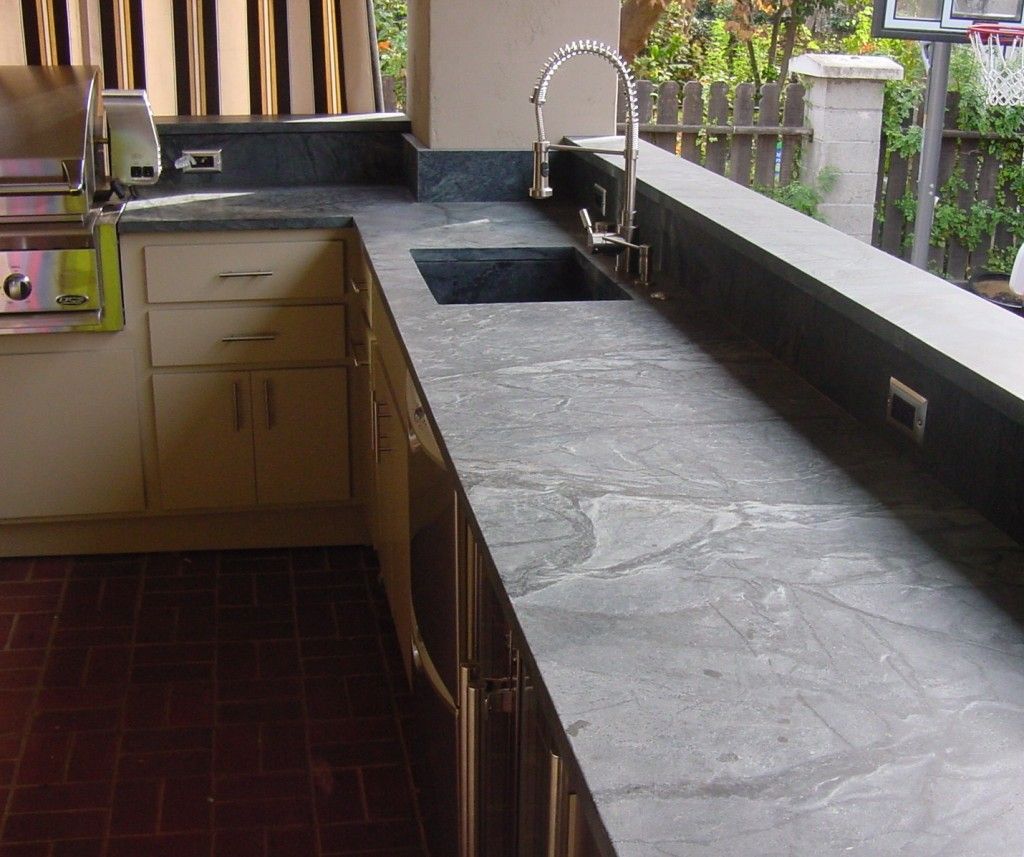
Soapstone has been used for countertops for many years. The warm, milky appearance of soapstone that allows it to complement other design features without overwhelming them. It is usually found in varying tones of whites and grays. It lies in between granite and marble in terms of hardness – not as hard as granite, but less porous than marble.
Pros
- The warm feeling and milky look, due to the high amount of talc in the stone.
- It gives kitchens an antique look.
- Because soapstone is rarely used for kitchen counters anymore, they create a conversation piece.
- It is less porous than other stone, soapstone resists stains and is fairly easy to clean.
Cons
- While harder than you might think, soapstone can be gouged and scratched.
- Soapstone is rather expensive, costing more than granite.
- These countertops should be oiled periodically to maintain their patina.
- Colors are limited to mostly shades of white and gray.
Soapstone is a somewhat rare material for kitchen countertops, making it a pricey option but one that some homeowners may enjoy for its uniqueness.
8. Slate
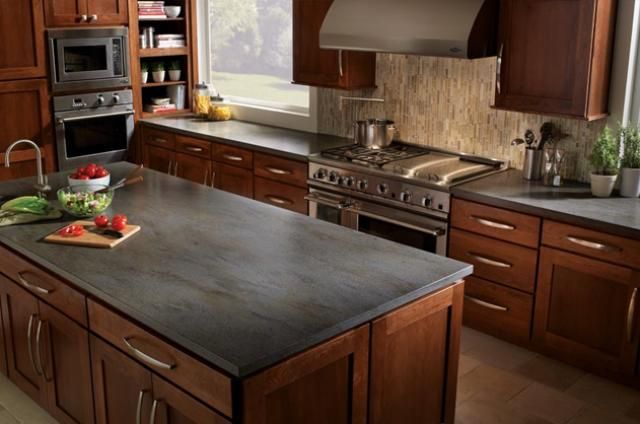
The final natural stone commonly found in countertops is slate. It is quarried straight from the earth, cut into slabs, and surface-grinded to a matte finish. It is a surprisingly good material for countertops since it is relatively non-porous and resists stains well. Although most people think of slate as a dark gray or black stone, some types have shades of green or pink within them. Unlike soapstone, slate has some subtle veining, though less dramatically than marble.
Pros
- It is non-porous and resists stains well.
- It resists bacteria very well.
- As it is hard and durable, slate countertops hold up very well.
- It is usually less costly than granite, marble, or soapstone.
Cons
- It has a gritty, matt texture that might not suit many kitchen preparation applications.
- There are fewer color options than with other materials.
Slate kitchen countertops are the right choice for homeowners looking for something unusual but subtle. There are surprisingly few downsides to slate countertops.
9. Solid surface Kitchen Countertop Materials
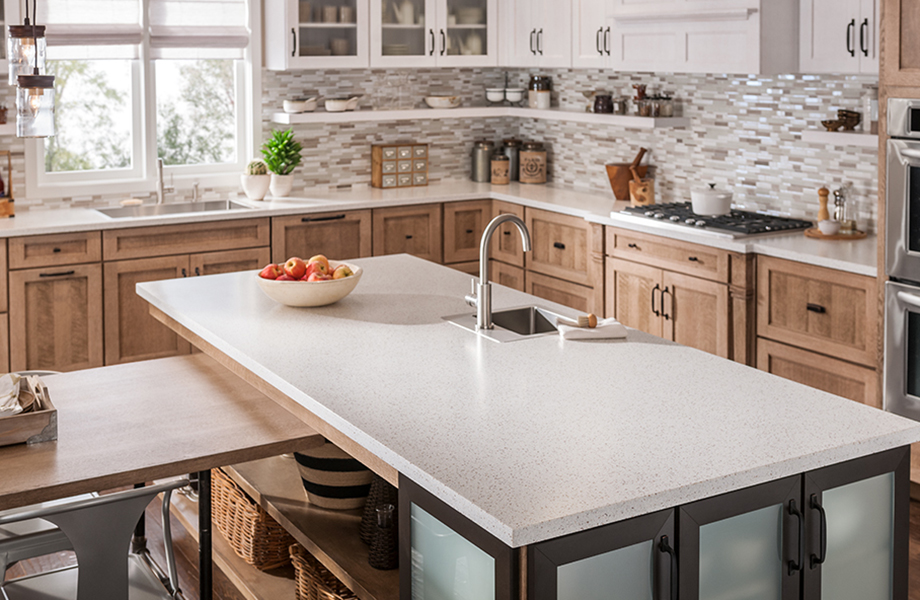
Solid surface is as an alternative design to resemble granite and other natural stone. It is mostly made of blends of synthetic acrylic and polyester materials, sometimes with a small amount of natural stone dust blended in. The material is held together with resins and shaped into slabs for use in countertops. You can mold the material into one-piece units with sinks integrated into the countertop.
Pros
- Solid-surface countertops are more affordable than natural stone and engineered quartz.
- The appearance gives a good simulation of granite or quartz.
- Minor scratches can be sanded or buffed out with fine sandpaper.
- Hundreds of colors and patterns are available, making this a very versatile material for kitchen design.
Cons
- Solid surface materials are prone to scorching and scratching.
- Once regarded as an upper-end material, solid-surface is now often seen as a cheaper alternative to engineered stone products such as quartz.
Solid surface kitchen countertops are very versatile and give a reasonable and much more affordable alternative to granite and engineered quartz. They’re not difficult to clean either.
10. Quartz Kitchen Countertop Materials
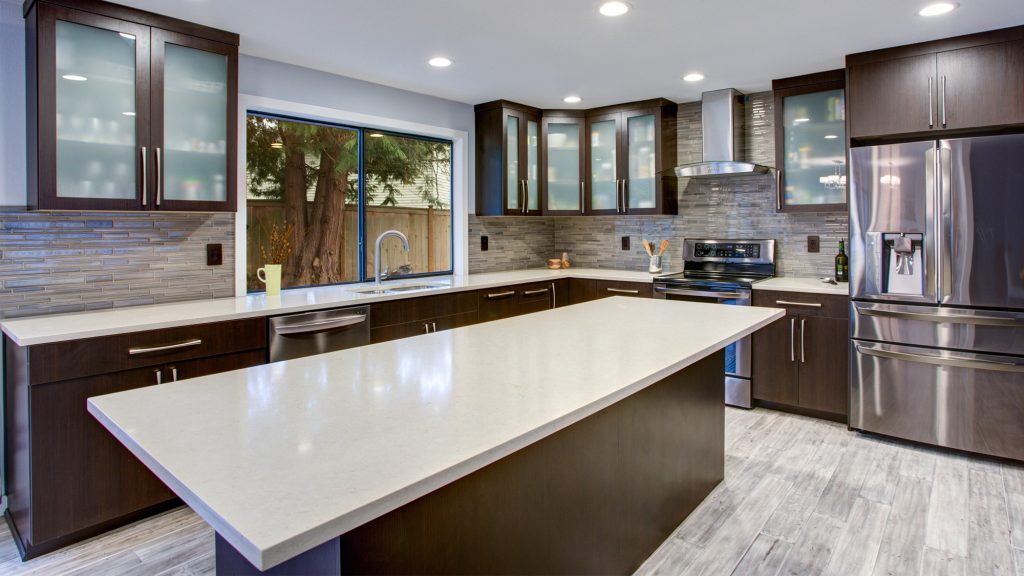
Quartz is the greatest and most popular manmade countertop. This material is composed of pulverized waste rock plus resins for hardness and binding. Thus, “quartz” countertops are not solid slabs of quartz mineral but instead are an engineered stone product. Many quartz counters have antibacterial agents added. Quartz is rapidly overcoming solid-surface material as a convincing alternative to natural stone for countertops.
Pros
- These are very beautiful countertops due to the inclusion of quartz crystals and other natural minerals.
- Quartz countertops are highly sought after, creating high resale value in a home.
- Many different colors and styles are available.
- These countertops are more durable and less susceptible to scratching than a solid surface.
Cons
- Quartz countertops are exceedingly heavy.
- They are quite expensive while comparing to natural granite.
- Experienced installers needed.
Quartz kitchen countertops offer the best of all worlds with the beauty of natural stone and the flexibility of solid-surface material.
Do you have anything to share? Please mention in the comment box.